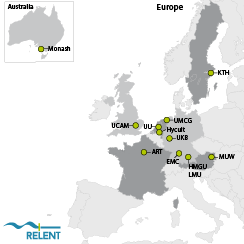The RELENT Project
RELENT is a multidisciplinary group of scientists and clinical investigators whose goal is to develop individualized treatment for chronic autoimmune diseases, such as rheumatoid arthritis and vasculitis. These diseases cause considerable mortality and morbidity, both from uncontrolled disease and treatment associated co-morbidities, like infection and malignancy. This requires the need to stratify patients by their outcome and to tailor immunosuppression based on much deeper knowledge of the mechanisms that control initiation and persistence of the pathogenic immune responses.
Note from Prof. Renate Kain, M.D., Ph.D., Project Coordinator
|
|
Severe autoimmune and inflammatory diseases currently need to be treated with long-term immunosuppressive drugs that have significant side effects. Despite this, the outcome for individual patients varies considerably. We currently have no means of distinguishing from the outset which patients will suffer from frequent relapses of their disease – and therefore need intensive early treatment – from those who will not. The RELENT project will apply an entirely novel approach to systematically define common disease mechanisms in autoimmunity, involving a fast and high throughput discovery and validation process. By combining clinical and serological data with genetic and transcriptomic signatures to unravel the molecular mechanisms that determine disease outcome, we will be able to develop customised health care for people suffering from autoimmune disorders. |
RELENT aims to shed light on the course and mechanisms of diseases, such as rheumatoid arthritis and vasculitis, and to develop improved diagnostics and intervention strategies with the expected impact of delaying the onset of chronic autoimmune diseases.








